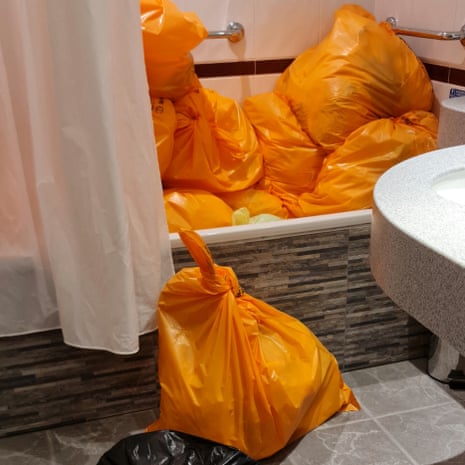A care worker at a hotel used to relieve pressure on NHS beds has claimed vulnerable people have been “failed”, with problems including stinking clinical waste being stored in a bathtub and a lack of accessible showers.
Lesley Horn, who worked in the the Future Inn hotel in Plymouth for two months told the Guardian she feared people were being “warehoused” in temporary care hotels, which health officials have been instructed to use amid an acute shortage of care packages.

More than 500 care homes are closed to new admissions because of outbreaks of Covid among residents and many more closed because of staff testing positive. There are also shortages of homecare workers so “care hotels” have been set up in places including Bristol, Norwich and Newquay. But there are rising concerns about their suitability.
Horn said a bathroom on the residents’ floor was periodically used as an overflow for clinical waste with bin bags filled with faeces and urine-soiled materials stacked up.
“You can imagine – you open the door and it was oh, my God, you are kidding me?” she said. “The smell. And this was not according to the infection control guidelines. It’s not on.”
Current NHS England guidance states that care hotels are supposed to be used for “days, rather than weeks” but Horn, who worked at the Plymouth hotel from late October to early January, said some residents stayed as long as two months. Care hotels are not regulated as care homes by the Care Quality Commission regulator, but they are recorded as locations where domiciliary care is being provided. CQC is currently undertaking a risk-based inspection of the Plymouth hotel.
Horn said there were only two walk-in showers for more than 30 of the residents and these were located on a different floor to their rooms. She alleged there were not always enough hospital-style beds and there was sometimes a lack of appropriate equipment such as commodes.
Devon NHS clinical commissioning group, Plymouth city council and the private operator, Abicare, defended the arrangements, said they did not agree with some of Horn’s claims and said “safety and quality of care are always our main priorities”.
They conceded there had been issues with a waste contractor, but said these were now solved and patient care was unaffected. They denied equipment shortages and said it was normal for hospital patients to walk a short distance to access a shower. Long stays were only in a very few cases where, because of homelessness or safeguarding concerns, discharge was difficult.
“Feedback from the people who have used the centre has been overwhelmingly positive and staff have been touched by the many cards and messages,” said Darryn Allcorn, Devon’s lead chief nurse, and Craig McArdle, strategic director for people at the council.
“The care hotel is just one of the many measures health and care partners have put in place to support the city’s main hospital during a period of unprecedented pressure when capacity in the care sector is challenged by the effects of the pandemic.”
The need to accelerate the discharge of hospital patients has been acute. Derriford hospital in Plymouth recently declared a level 4 alert, which means patient safety could be compromised.
But domiciliary care operators have warned that “care hotels … may not be equipped to meet [the] needs” of older and disabled people.
“It should never have come to this,” said Jane Townson, the chief executive of the Homecare Association. “We call on the government to invest properly in home-based support and care, so we can enable people to live well at home … take pressure off the NHS and reduce costs for the health and care system.”
Last month the daughter of a resident at a care hotel in Bristol complained her father hadn’t been seen by a nurse for a week. Linda Slade told the BBC: “He has a stoma bag, they didn’t know anything about stoma bags or what to do.”
Kate Terroni, CQC’s chief inspector of adult social care said the regulator would “engage providers to ensure high quality care for people in these settings” and “inspect in response to concerns”.
Horn, who has worked in healthcare for 40 years, said conditions of some residents being discharged were worse than she would usually see in care settings. Health officials countered that all discharges had been deemed medically appropriate.
Horn said it felt as though people were being “warehoused” and said: “They are put in our hands to give them the best care we can and this is where I feel we were put in a corner … It was difficult for us.”
The providers said these were the opinions of one person but that they strongly disagreed with them.
Most rooms had conventional baths, which are not accessible to many people in care settings, but there were two walk-in showers on the fourth floor, one in a room stacked so high with furniture that it was impossible to turn the main light on, Horn said. It required care staff to take residents up in a lift, usher them through the darkened room and give them a shower.
“It’s horrible,” Horn said. “This isn’t the type of environment you take somebody in.”
The Department of Health and Social Care said it had made £3.3bn available to assist timely hospital discharge since the pandemic began, with funding due to continue until March.










